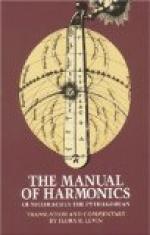|
This section contains 363 words (approx. 2 pages at 300 words per page) |
World of Mathematics on Nicomachus of Gerasa
Born in Gerasa, Palestine (now Jerash, Jordan), Nicomachus is mainly known for his work in arithmetic. He has been credited with founding Greek arithmetic as a separate mathematical discipline, and is also considered a notable representative of Neo-Pythagorean philosophy.
Formulates Arithmetical Theorem
Before discussing Nicomachus' work in arthimetic, it is important to understand, as Carl B. Boyer explains, that the Greek term arithmetike, although derived from the word arithmos , which means number, did not refer to actual calculation, but rather denoted theoretical, speculative thinking about numbers. Nicomachus' ideas about numbers is pretty much defined by Pythagoras, or, more precisely, the Neo-Pythagorean tradition that he represented. In his Introduction to Arithmetic, Nicomachus discusses various kinds of numbers (odd, even, prime, composite, figurate, perfect), but also considers numbers as divine entities with apparently anthropomorphic qualities, such as, for instance, goodness. However, his discussion of odd and even numbers, which for Pythagoreans raised fundamental ontological questions, also contains practical aspects, including the following theorem. By grouping the odd integers in the following manner: 1; 3 + 5; 7 + 9 + 11; 13 + 15 + 17 + 19, Nicomachus discovered that the sums were equal to the cubed integers. For example, 13 = 1; 23 = 3 + 5; 33 = 7 + 9 + 11; 43 = 13 + 15 + 17 + 19, etc.
Nicomachus' world view is a fascinating blend of mathematics and philosophy, incorporating the main currents of Greek scientific, idealistic, and mystical thought. "In his system," Frederick Copleston has written, "the Ideas existed before the formation of the world (Plato), and the Ideas are numbers (Plato again). But the Number-Ideas did not exist in a transcendental world of their own: rather, they were Ideas in the Divine Mind, and so patterns or archetypes according to which the things of this world were formed (cf. Philo the Jew, Middle Platonism and Neo-Platonism)."
Proposes Eclectic Approach to Musical Theory
In his Manual of Harmonics, Nicomachus discusses musical scales, notes, and intervals. Following the Pythagorean tradition as well as his interest in numerical ratios, he defines notes and intervals on the basis of numerical ratios. However, he also seems to have accepted the idea, developed by the noted music theorist Aristoxenus, that in music, for example, in determining whether an interval is consonant, auditive perception plays a crucial role. It is interesting that Nicomachus attempts to reconcile two opposing traditions in music theory.
|
This section contains 363 words (approx. 2 pages at 300 words per page) |


